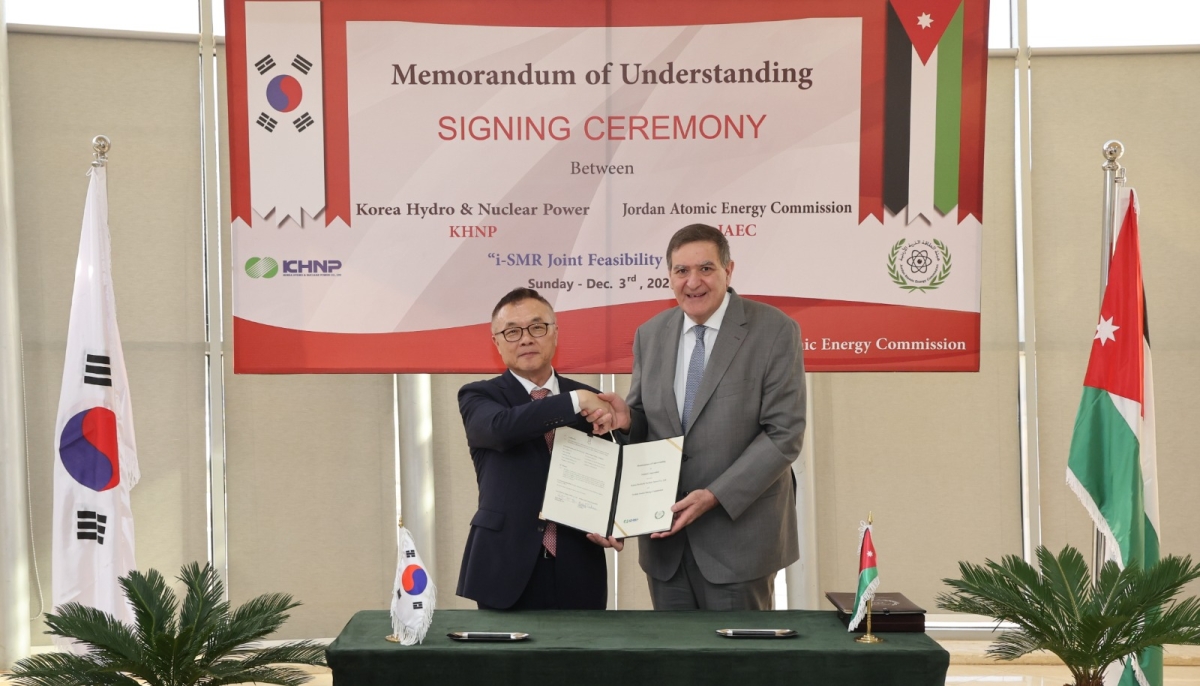- Local News
- Tue-2023-12-05 | 05:48 pm

Nayrouz News Agency : The Jordan Atomic Energy Commission (JAEC) and the Korean Hydro and Nuclear Power company (KHNP) signed a memorandum of understanding in Ramtha on Tuesday, initiating a joint effort to conduct a technical and economic feasibility study for an innovative small modular reactor (i-SMR). Designed by KHNP, the pressurized water technology-operated reactor boasts a 170-megawatt capacity per unit.
Head of the JAEC Khaled Touqan highlighted Jordan's ongoing commitment to realizing its national vision of utilizing nuclear energy for peaceful purposes. He emphasized the progress achieved in the Jordanian nuclear energy project, including work on a nuclear station with SMRs for the co-generation of electrical energy and seawater desalination.
Touqan pointed to global recognition of the role of nuclear energy in reducing carbon emissions, particularly at the World Climate Conference (COP28).
He noted the positive trajectory of Jordanian-Korean relations in nuclear scientific fields, citing the successful collaboration in constructing and operating the Jordanian Research and Training Reactor, through the Korea Atomic Energy Research Institute and Daewoo Engineering and Construction Company
CEO of the KHNP, Whang Joo-ho, expressed the intention to deepen cooperation between the two entities, aiming to evolve into strategic partners. He highlighted the positive reception of KHNP's i-SMR reactor design at COP28, positioning it as a primary energy source for zero-carbon emission smart cities.
Commissioner of Nuclear Energy Reactors at JAEC, Khaled Khasawneh, stated that the agreement with the KHNP aligns with the commission's aspirations to explore the use of SMRs in the national energy mix post-2030, underscoring the versatility of nuclear energy in various applications such as power generation, water desalination, hydrogen production, and industrial use.
Khasawneh detailed ongoing technical studies and evaluations for different SMR designs, including feasibility studies for nuclear energy applications in water desalination in Jordan. Given Jordan's water scarcity, efforts to address the water deficit include projects like the National Carrier Project, focusing on desalinating Red Sea water to provide 300 million cubic meters of desalinated water annually, he added.
The JAEC is committed to advancing nuclear projects, with a specific emphasis on electricity generation and water desalination using nuclear energy. The collaboration with the KHNP is expected to expand the commission's projects in the realm of small, modular, multi-use reactors.
Head of the JAEC Khaled Touqan highlighted Jordan's ongoing commitment to realizing its national vision of utilizing nuclear energy for peaceful purposes. He emphasized the progress achieved in the Jordanian nuclear energy project, including work on a nuclear station with SMRs for the co-generation of electrical energy and seawater desalination.
Touqan pointed to global recognition of the role of nuclear energy in reducing carbon emissions, particularly at the World Climate Conference (COP28).
He noted the positive trajectory of Jordanian-Korean relations in nuclear scientific fields, citing the successful collaboration in constructing and operating the Jordanian Research and Training Reactor, through the Korea Atomic Energy Research Institute and Daewoo Engineering and Construction Company
CEO of the KHNP, Whang Joo-ho, expressed the intention to deepen cooperation between the two entities, aiming to evolve into strategic partners. He highlighted the positive reception of KHNP's i-SMR reactor design at COP28, positioning it as a primary energy source for zero-carbon emission smart cities.
Commissioner of Nuclear Energy Reactors at JAEC, Khaled Khasawneh, stated that the agreement with the KHNP aligns with the commission's aspirations to explore the use of SMRs in the national energy mix post-2030, underscoring the versatility of nuclear energy in various applications such as power generation, water desalination, hydrogen production, and industrial use.
Khasawneh detailed ongoing technical studies and evaluations for different SMR designs, including feasibility studies for nuclear energy applications in water desalination in Jordan. Given Jordan's water scarcity, efforts to address the water deficit include projects like the National Carrier Project, focusing on desalinating Red Sea water to provide 300 million cubic meters of desalinated water annually, he added.
The JAEC is committed to advancing nuclear projects, with a specific emphasis on electricity generation and water desalination using nuclear energy. The collaboration with the KHNP is expected to expand the commission's projects in the realm of small, modular, multi-use reactors.










